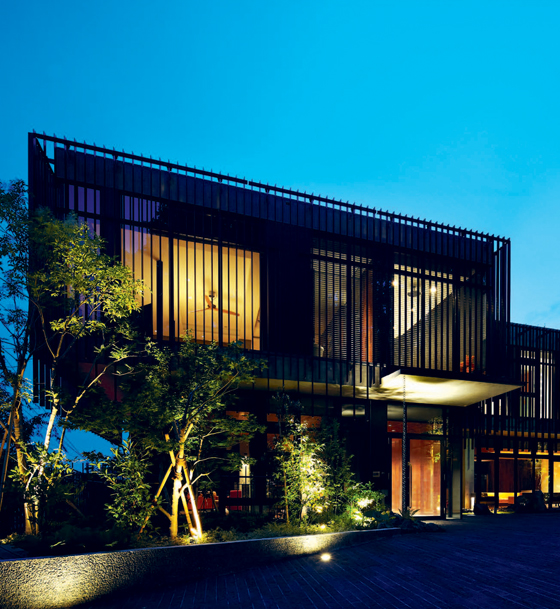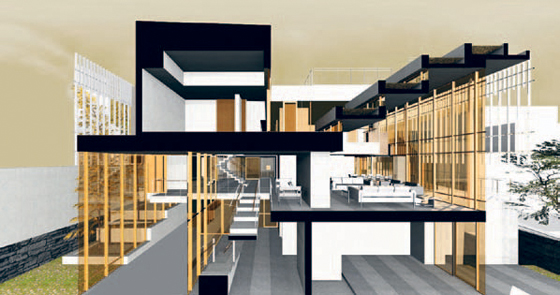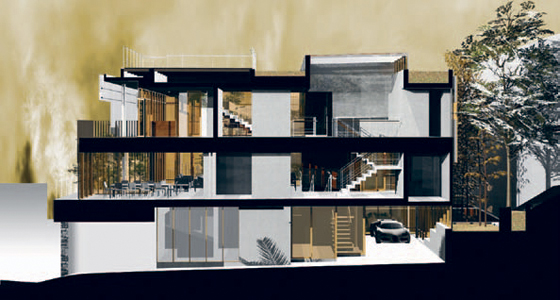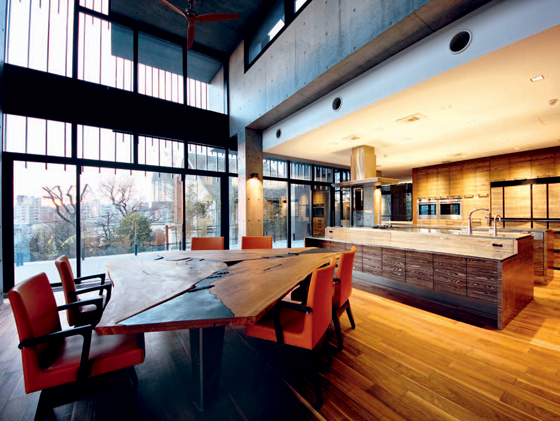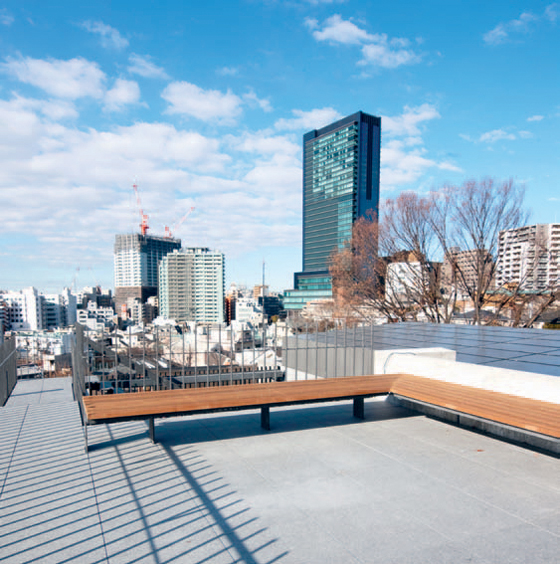Thermal versatility
Scritto da Indesign Media Asia Pacific
Australia
01.09.14
A house in Tokyo balances year-round thermal comfort with issues of privacy (Text by Stephen Crafti)
New architect-designed homes in Tokyo are often impenetrable from the street. However, this house, in an exclusive enclave, takes the opposite approach. Designed by Riccardo Tossani Architecture, the house is almost entirely glazed, with fine aluminium blades creating just a veil of privacy. “We wanted to capitalise on the views over a nearby park, as well as maximising light,” says architect, Riccardo Tossani, who worked closely with his partner, Interior architect, Atsuko Itoda. Arup Engineers also formed part of the team. “Many new homes turn their back on neighbours,” says Tossani. “The density in Tokyo often favours this approach.”
Designed for a couple with two young children, the three-level house is perched above a retaining wall. Benefiting from a wide frontage and generous site, the house commands attention. Constructed in concrete, steel and aluminium, the generous use of glass also set up a series of challenges for the architects. “Our design meant we had to balance a comfortable thermal environment with the need for privacy,” says Tossani, who used the latest technology to achieve this balance.
The gentle rise of the timber treads creates a procession-like effect to the garage, which includes a number of prestige cars
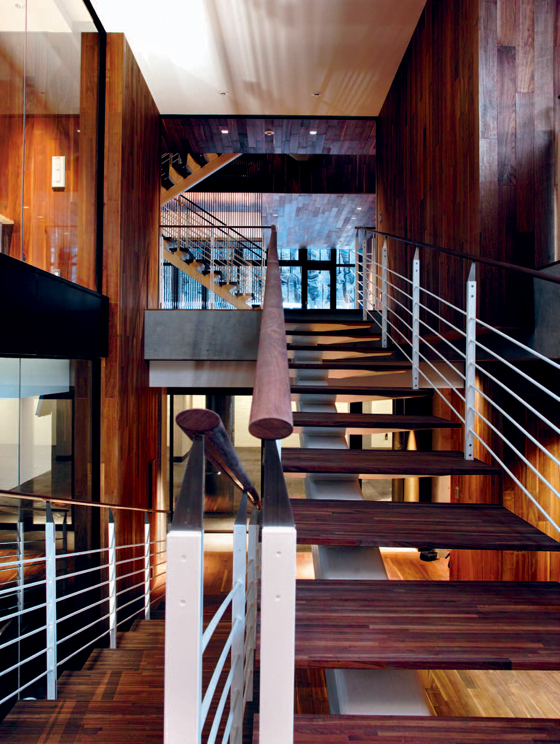
The gentle rise of the timber treads creates a procession-like effect to the garage, which includes a number of prestige cars
×The house’s external aluminium brise soleil has been carefully designed in length to follow the path of the sunlight, with the blades lengthening in critical areas to filter the harsher afternoon sunlight. The width of the eaves also responds to the sun, as does the tinted low-e glass used for windows and doors. And rather than conceal the hydronic heating inside the home, Tossani fully expressed these panels as freestanding screens, creating a further ‘veil’ to the street where required. External automatic blinds also reduce the impact of sunlight during the summer months. “We also included fly wire screens on windows and doors to allow cross ventilation during the warmer months,” says Tossani.
The aluminium blades surrounding the home create privacy while allowing light to penetrate –an unusual treatment given many new homes in Tokyo are inward looking, with external concrete walls
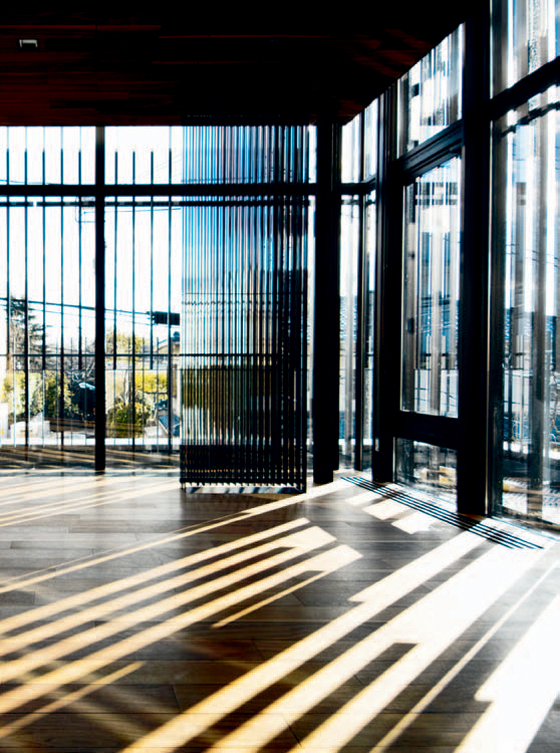
The aluminium blades surrounding the home create privacy while allowing light to penetrate –an unusual treatment given many new homes in Tokyo are inward looking, with external concrete walls
×While the owners didn’t use the words ‘sustainable home’ in their brief, they also didn’t want to live in a sealed environment that didn’t respond to the seasons. “Our clients mentioned from the outset they didn’t want to be reliant on air-conditioning,” says Tossani, who included solar panels on the roof, as well as ceiling fans in a few of the rooms. “There’s an even temperature through the house, irrespective of the season,” he adds.
Designed over three-levels, this house starts with a museum-like garage at basement level. Featuring generous glazing like the rest of the house, the owners’ limited edition car collection can be appreciated from a ramp-like staircase, with broad timber treads allowing for contemplation. “The staircase has that Le Corbusier promenade style,” says Tossani. As the owners regularly have family and friends staying from overseas, there are also two guest bedrooms and bathrooms at basement level, together with generous storage areas. “The garage was an important part of the brief. Our client didn’t want the cars to bescreened behind a garage door.”
Section renders. note the solar ‘block’ which rises through the structure with vertical and horizontal surfaces clad in photovoltaic panels. There is also a skylight providing natural light and ventilation to the open stair core and adjacent rooms
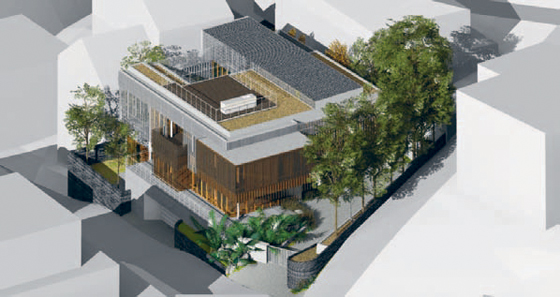
Section renders. note the solar ‘block’ which rises through the structure with vertical and horizontal surfaces clad in photovoltaic panels. There is also a skylight providing natural light and ventilation to the open stair core and adjacent rooms
×The owners Marco and his wife Mimi not only wanted the garage to be integral to the house, they also wanted an open plan house rather than the traditional Japanese home, with a series of small enclosed spaces. “Mimi and I love entertaining and having friends around. But we also wanted the option of separating spaces if the children have friends over,” says Marco, pulling out a large sliding glass door from a cavity wall. “The spaces are extremely flexible,” he adds.
The kitchen and double-height dining space feature richly detailed timber joinery
Although the living spaces at ground level are used all year round, the architects included a ‘winter’ living room, with a gas fireplace embedded on the coffee table, as well as a ‘summer’ room, the latter framing a moss garden. As well as these two additional living spaces, there is a play area adjacent to the kitchen for the children, together with a large family room on the first floor for the entire family. Conveniently located next to the bedrooms, including the main, the first floor also benefits from a kitchenette. “It’s almost a self-contained suite on the first floor,” says Tossani.
The rooftop terrace with views over Tokyo, note the skylight
While the house is beautifully landscaped with a Japanese-style garden, there are also two roof terraces, one accessed via a dramatic steel staircase. “We love coming up on the terrace and looking out over the park and neighbourhood. It’s an idyllic setting for entertaining,” says Marco, who feels totally relaxed wandering through the house. “There’s no formality and you can wear shorts and T-shirts the entire year,” he adds.
___
Architects: Riccardo Tossani Architecture
Location: Tokyo, JAPAN
Project: R Residence
Photos: Riccardo Tossani
